by Laura Swanson
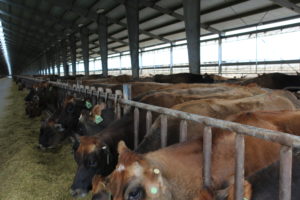
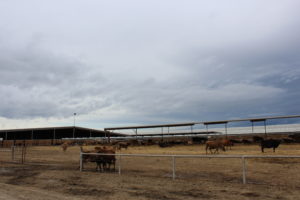
It’s just not that simple, or easy. Farming, in particular dairy farming. “It’s a dynamic, biologically diverse living system that requires diligent care and attention,” describes Threemile Canyon Farms General Manager Marty Myers. “365 days a year, 24 hours a day, seven days a week, we are in constant motion around here,” he continues. “You should see it during the heart of harvest season.” It’s planting season right now – organic peas and potatoes are going in and soon the triticale (a ryegrass/wheat used by dairy farmers for feed) will be harvested and the crop rotation will continue, constantly. Having just experienced the most severe winter in the farms’ history – adding snow, ice and some of the coldest temperatures, everyone is relieved to finally see Spring. Instead of focusing on the change of the seasons, recent misleading and blatantly untrue blogs and editorials have managers and all the employees shaking their heads about how the general public doesn’t understand what it means to provide food for the American table. “We’re really proud of the work we do here, how we care for our animals, the environment, the land, our community,” said Jeff Wendler, Threemile Canyon Farms livestock manager. “What’s been said are just lies,” he continued. “The girls (he’s referring to the dairy cows) are our life and livelihood. We take the best care of them,” added the trained vet Wendler. “I love cows.”
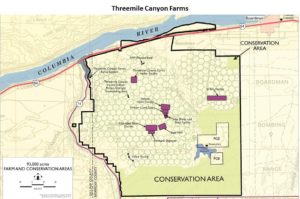
145 square mile Threemile Canyon Farms is a model for efficiency and environmentally responsible farming, based on the standards required by many of the farm’s partners, including the Tillamook County Creamery Association (TCCA) and several other leading national producers. 81,000 head of livestock (32,000 milking dairy cows; 35,000 heifers; 2,000 organic dairy cows; and 12,000 specialty pasture beef cattle), combined with 39,500 acres being farmed including nearly 9,000 acres with organic vegetable production, is a win-win for the local economy and for suppliers. The 93,000 acres, roughly the size of the Portland metropolitan area, is essentially in the middle of nowhere – 10 miles west of Boardman, and looks like an oasis in the middle of the desert-like plains along the Columbia Gorge.
It’s taken a decade and a half to get to this level of production for both the dairy and the organic farming, and future plans foresee the farm’s organic production in 2020 at over 15,000 acres. And it almost didn’t happen. In 1998, Marty Myers approached TCCA to take a look at the farm plan for Threemile Canyon as the co-op was looking to expand its dairy herds, realizing the demand was growing for Tillamook products, and the county could not support more dairies. “They were looking for a drier climate, and at 20 sites in other states,” said Myers, a fifth generation farmer. “We were number 21, and in April, 2001 we started with 400 cows, and in August, 2001 TCCA opened the Boardman plant.”
As Myers shows off the computer-aided irrigation system and talks about the many technology innovations the farm utilizes, he mentions the endangered Washington ground squirrel. “When we laid pipe for our irrigation systems in 2000, we worked with the Nature Conservancy to make sure we had a low impact on the squirrels’ habitat,” he explained. Due to these and other efforts, the squirrel was prevented from being added to the US Fish and Wildlife Service endangered list, narrowly avoiding the need for federal protection. 23,000 acres of Threemile Canyon Farms is a dedicated conservation area. Like many of the best practice programs at the farm, they didn’t have to do things this way.
“We are always improving,” said Myers. “We raise the bar, helping move the industry toward using these voluntary programs. It’s the best thing if we want to be able to say how we treat our animals.” Myers is referring to their several tiered, third-party audited animal welfare programs. Again, on a voluntary basis, they audit themselves by bringing in an independent company for monthly checks and reviews of the animals’ welfare, and then a more in-depth review is performed by animal advocates from Evergreen University. “We take pride in doing it the best,” said Wendler. “Our reproductive program focus is on longevity and health, equal to production, and we have won national awards for our reproductive health.”
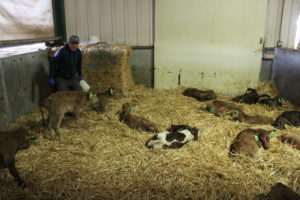
There are 80 to 150 calves born daily at Threemile Canyon Farms, and calving cows are left with the herd, have their calves naturally and 24/7 “rovers” keep a constant eye on them. Shortly after birth the calves, born with no immune system, are brought in and the mothers are immediately milked. That milking contains the highest proteins, antibodies and good bacteria – the colostrum, it is separated from the other milk, and tube fed immediately to the calves, then later on, the calves are bottle-fed. “We have developed a system that has improved our calf mortality, to one of the lowest in the industry,” said Wendler. “We do as good or better than most.”
And that statement defines all of Threemile Canyon Farms operations. “The cows are the farms’ heart and soul, our living and our livelihood, we want to make sure we are taking the best possible care of these animals,” said Wendler. The herd, 85% jersey and 15% Holstein (“that’s what TCCA wanted”) is milked twice daily using four 72-cow and two 80-cow carousels, producing 210,000 gallons per day. There is no “herding” the cows to the barn. Each animal is identified by electronic ID “earrings” as they enter the barn in calm order. There are little or no disturbances, and even with this number of animals this was by far the quietest barn and milking facilities , and the largest – that this reporter has ever seen. And I’ve been to quite a few dairy farms. The only noise was from the sound of machinery and tractors in constant motion, tending for the all the cows’ needs; and again, computerized from the feeding systems to the regular flushing of the barns.
The most challenging aspects of Threemile Canyon Farms are water and waste; the farms have developed a zero-waste discharge system and utilize three methane digesters to recapture and recycle the water and the manure. All the digester by-products, the liquid “fertilizer” and the solids “digested fiber” are used on the farm. The nutrients are spread on the soil for the organic farming, the fiber is used for animal bedding, mulching, and as a soil additive and the digester produces 4.5 megawatts of power. The farm has reduced its carbon footprint with these systems by removing 60,000 tons of carbon annually. “The comparisons have been made about our waste being the size of Willamette Valley cities, but what are those cities doing with their waste?” commented Myers. “During some rainy seasons, it can overrun waste treatment facilities and end up in the Willamette River. We have a closed-loop system here. We handle the waste and put it back to beneficial use.”
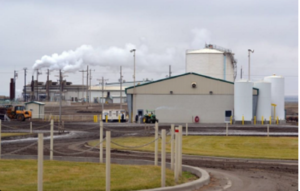
The three methane digesters were put into operation in 2012 at a cost of $32 million and are currently undergoing a $3.8 million retrofit project. “The farm does receive some bio-mass tax credits for operating the digester,” said Myers. “And we just voluntarily reduced the tax credit by 30 percent.” Myers has served on the Dairy Air Task Force and been instrumental in developing the best management practices and recommendations for the state. “The farm has the gold standard in waste management and we approach this with a futuristic view of dairy farming,” added Myers.
That’s exactly what TCCA was doing 16 years ago when they looked outside of Tillamook to grow the company’s brand and meet the market demands for the very popular dairy products. (See additional stories about TCCA products and temporary visitors center.) Threemile Canyon Farms and TCCA have a positive impact on the Boardman community, providing scholarships, job opportunities, even matching funds for Boardman Medical Center, just as the Tillamook County Creamery Association (TCCA) has provided support for Tillamook County. At the recent TCCA annual meeting, CEO Patrick Criteser predicted that the Tillamook brand would become one of the most popular in the next five years. With production and partners such as Threemile Canyon Farms, TCCA is poised to do just that, especially with 92 other dairies that also adhere to high standards of quality. This is dairy done right.
For more about Threemile Canyon Farms, go to http://www.threemilecanyonfarms.com/
Watch for more stories about the Pioneer’s trip to Threemile Canyon Farms.

